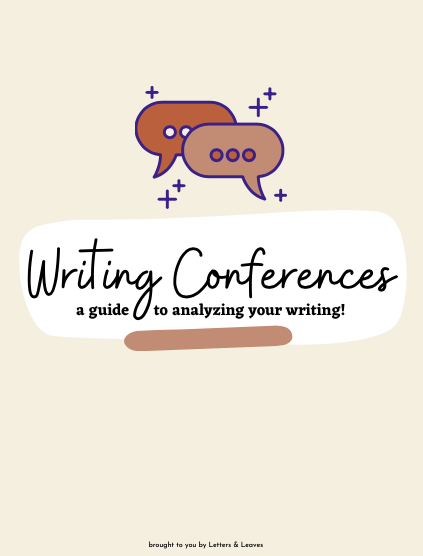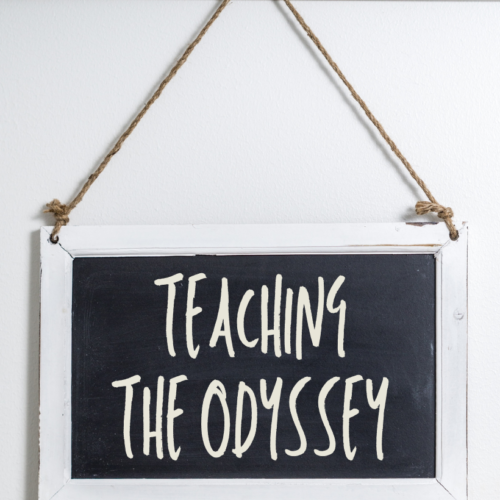In this blog post, I’m going to walk you through the pedagogy and process of student writing conferences. This process completely shifted my teaching and writing instruction.

One of the most fundamental shifts to my pedagogy as an English teacher came a few years ago. As a teacher, I know the importance of student self-reflection. They need to think about what they’ve learned, and often that process of metacognition is difficult for them. Too often, they shortcut that thinking and tell me what they think I want to hear.
If this sounds like the students in your classroom too, then perhaps the same shift I implemented into my practice will help. The shift? Student writing conferences.
Although they take time, like anything else, they are abundantly worth it. My students’ ability to analyze their own writing is now a genuine process rather than a superficial hoop. Granted, it’s not a perfect practice. I’m always looking for ways to improve it to ensure all my students, even the reluctant ones, fully engage in the reflection process. But, it is much better than what I used to do–what many English teachers do: collect their final draft, grade in isolation, and move on.
In this process, the writing conference process, students aren’t done when they turn in that final draft. They have to do the heavy lifting in terms of analyzing and breaking down what they did, why they did it, and how this essay meets, or doesn’t, the expectations.
If you’re thinking, wait, what? I can have students do that? Yes, my friends, you can.
Student Writing Conferences – The Premise
A few years ago, my mentor and colleague shared an article with me “Annotation-Drive Conferences: A Pragmatic Approach to Papers, Papers, Papers” by Marissa E. King and Karen Sheriff LeVan. She said, “We need to do this. This will change everything.” Hopefully, you have someone in your world who finds amazing resources and pedagogy-improving ideas. I swear my colleague is a wizard at this! I’m very lucky.
I highly suggest you read the article yourself. In short, these educators trained their students to break down the “why” and “how” of their own writing, hold conferences where they, the students, lead the discussion about those “why”s and “how”s, and then grade themselves. In the piece, they admit this is not the easiest process, it takes training. It takes conversation, but eventually, and I can attest to this, students get it.
Rarely, at this point, do I disagree fundamentally with a students’ self assessment. They know the expectations, they know how to read and break down the rubric, the prompt, and apply those expectations to their own writing. They set goals for themselves for next time. Also, equally important, they celebrate their own growth. They talk to me about what they did well, and how they’ve improved since last time.
So, how did we get to this point? After reading the article, our department sat down and spent hours working out: “how can we do this?” This is the most important part. This needs to be a grade-level, if not department-level, process. If students only do this for one year, they aren’t going to learn as much or develop the same depth of skills. They need to do this every year, multiple times a year.
Student Writing Conferences – Our Process
Ultimately, we developed a process for 9/10 graders, and modified it for the growing sophistication of our 11/12 graders.
First, we have a department-wide writing rubric that we use. This was developed in conjunction with the English 1 professors at the community college in our area. Because many of our students take English 1 before they graduate high school, we worked with the English 1 professors to identify the essential writing skills. (I can’t share that rubric here, as it belongs to the school.)
Once you have a rubric established, and it is possible to develop a rubric that applies to all genres of writing, then that becomes the cornerstone of this practice. You can also use different rubrics, you would also then need to modify your conference “talking points” (which I’ll explain soon) to match.
Second, train your students to understand the rubric. How do you use it to grade their writing? I suggest breaking down the rubric with your students. Talk about the statements and different qualifications for “exceeding/A” writing and “meeting/B” writing. Then, have students put these ideas into practice by grading a sample essay. They can work together in groups or partners, too.
Then, have a class discussion, what does this essay earn and why? This conversation is pivotal. For students to conference on their own essay effectively, they need to start thinking like a writer and a reader. Their essay must become something they step back from and can break down to see strengths and areas for growth. But, as we know, this is hard for many reasons. Who wants to see their own flaws?
By starting with someone else’s essay, they can understand the process and see what it is, and what it isn’t. It is a process to analyze writing and the decisions the writer made. It is not a condemnation.
Third, from there, they apply these same skills on their own essays. At my school, we typically have three summative essays per semester, and we try to have conferences for them all. While we write more often than just “three times a semester,” these are the three pieces where we go through the whole writing process: thesis, outline, rough draft, revision, final draft, conference.
When we give out the prompt for these larger writing pieces, we tell students: we will conference. Then, we have them focus on creating an essay. Once students are working on revising their rough draft, we remind them of the conference again. At that point, we start to go over that process.
For us, this involves an Annotation and Conference Guide handout that reminds them of the purpose: to empower them with the opportunity to reflect on their own writing and advocate and prove to their teacher the grade their essay earned.
And, the Conference Guide provides them with the specific talking points what we want to hear in the conference. We provide them with sentence frames for what we want them to cover. These sentence frames are based on the writing rubric and what we have focused on teaching them. For example:
- I used transition signals and phrases in my essay to help ______. My favorite transition signal is this because it effectively ________.
- I used __[quote you used in paper]___ as evidence in my writing because it helped me show ______________. This was the best quote to choose because ______________________[how does it support your points].
- My Works Cited is in MLA format because it _______, _______, and _______.
Now, out of necessity, you need to consider timing. How many days can you set aside to do these conferences? How many students do you have, and how long can each conference be? Typically, we time the conferences between 4-7 minutes, sometimes longer for the last essay of the semester or school year.
Also, you’ll need to consider: What will students who are not presently conferencing do? Sometimes, we have them work on prepping for the conference. Or, for the students who somehow still haven’t finished their essay–they’re writing it. Maybe, they’re reading a book, or completing a creative project. For me, the room does need to be pretty quiet, so I can hear the student I am conferencing with, but decide what works for you!
During this past year, with online teaching, we have cut back on the amount of conferences (less class time). However, we’ve still managed to have 2 face-to-face (or live video) conferences with students. And, we’ve also had students complete the “conference” process using a voice recording app, Talk and Speak. This was a bit like an asynchronous conference.
Even with the limitations of this year, our students are developing these analysis and reflection skills, and it is super exciting!

Student Writing Conferences – Worth it?
Why would you want to do this, if it takes so much time? Because.
This process empowers students. They have a say in their essay grade. They have to sit down with their paper another time and analyze it: What went well? What didn’t? And why? They have to think like a writer and a reader. Me? Well, I have to train them on this process and then guide them through it. I don’t have to grade in isolation. I don’t have to justify the grade to them anymore about why I “gave them” a grade.
Mostly, the essays are better, so those conversations happen less. But also, the students recognize when their essays don’t meet expectations, and they lead that conversation about what their essay earned.
Like I mentioned earlier, for some of the essays this year, it just wasn’t feasible to do live conferences. If you face a similar situation with a writing piece, but you still want to have students reflect, there are ways to do this. However, I also believe you need to respond.
This idea, this “conversation,” is the key to this working. If students let something out of their hands, if they pass off the responsibility and never have to think or look at something again, then they don’t learn from it. It ceases to exist for them. We’re all like this, right? If I don’t have to use this knowledge again, then why would I keep it in my brain?
Sarah Brown Wessling uses voice comments to give students feedback. Plus, she gives time for students to listen to those in class. This means they can’t escape the feedback! They have to listen and, hopefully, respond.
When I don’t have time to conference, I use voice comments. At first, it seems to take longer than giving written feedback. But if you narrow down what you will give feedback on, the writing skills students really need to work on to grow (like thesis statements, introducing evidence, etc), and you only give feedback on those things, then it is much faster. Simply put, we speak faster than we write.
Student Writing Conferences – Some Resources
Now, if I’ve convinced you to try out student writing conferences, yay! I’m so glad! You will not regret it. Stick with it, and it will be so worth it.
If you want a jump start, check out this resource I’ve created to help.
Writing Conferences – A Guide
If you have questions or want to share your own experience, please reach out! I’d love to hear what you’re trying in your classroom.
Happy teaching 🙂

 The Odyssey: A Guide to Prepping Students with Pre-Reading Activities
The Odyssey: A Guide to Prepping Students with Pre-Reading Activities 5 Engaging Lesson Plans: Convergence of Self and Place in Jamaica Kincaid’s “Girl”
5 Engaging Lesson Plans: Convergence of Self and Place in Jamaica Kincaid’s “Girl” Continue Teaching: 9 Tips to Sustain Your Love of Teaching
Continue Teaching: 9 Tips to Sustain Your Love of Teaching